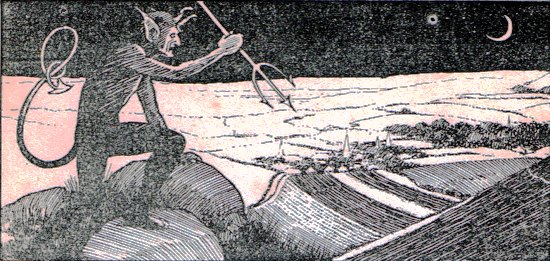
The following legend, founded on a popular Sussex error, from which the Devil’s Dyke takes its name, was written many years ago by William Hamper, Esq., of Birmingham, F.R.S., and Justice of Peace for the counties of Warwick and Worcester, a native of Sussex, from the family of Hamper at West Tarring, and was circulated at the time it was written amongst his Sussex friends.
Five hundred years ago, or more,
Or, if you please, in days of yore,
That wicked wyght, yclept old Nick,
Renown’d for many a wanton trick,
With envy from the Downs beheld
The studded churches of the weald;
Here Poynings cruciform — and there
Hurst, Albourne, Bolney, Newtimber, —
Cuckfield, and more, with tow’ring crest,
Quae nunc prescribere longum est; —
Oft heard the undulating chime
Proclaim around ‘t was service time;
While to the sacred House of Prayer
Went many a pious worshipper.“Can I with common patience see
These churches — and not one for me?
Shall I be cheated of my due
By such a sanctimonoius crew?”
He mutter’d twenty things beside,
And swore that night the foaming tide,
Led through a vast and wondrous trench,
Should give these pious souls a drench.Adown the west the steeds of day
Were hasting merrily away;
And Night in solemn pomp came on,
Her lamp a star, a cloud her throne;
The lightsome moon, she was not there,
But deck’d the other hemisphere.Now fit with a capacious spade,
So large it was on purpose made,
Old Nick began with much ado
To cut the lofty Downs in two; —
At every lift his spade threw out
A hundred waggon loads, no doubt! —
O! had he labour’d till the morrow,
His envious work had wrought much sorrow;
The weald, with verdant beauty graced,
Changed to a sad and wat’ry waste!But so it chanced, a good old dame,
Whose deed has long outlived her name,
Waked by the cramp at midnight hour,
Or just escaped the nightmare’s pow’r,
Rose from her humble bed; — when, lo! —
She heard Nick’s terrible ado! —
And by the starlight faintly spied
The wicked wyght — and Dyke so wide;
She knew him by his mighty size,
His tail, his horns, his saucer eyes;
And while, with wonderment amazed,
At labourer and at work she gazed,
Swift ‘cross her mind a thought there flew,
That she by stratagem might do —
A deed which luckily should save
Her country from a wat’ry grave!
By his own weapons fairly beating
The father of all lies and cheating.Forth from a casement in a, in a minute,
A sieve with flaming candle in it
She held to view; — and simple Nick,
Who ne’er suspected such a trick,
(Old rogues are fools) when first his sight
A full-orb’d luminary bright
Beheld — he fled — his work undone,
Scared at the sight of a new sun,
And mutt’ring curses that the day
Should drive him from his work away!Night after night, this knowing dame
Watch’d — but again Nick never came.Who now dare call the action evil,
“To hold a candle to the devil?”
[This piece, including the title and prefatory paragraph, but not the illustration, is reproduced from pages 189-191 of James Taylor, editor, The Sussex Garland: A Collection of Ballads, Sonnets, Tales, Elegies, Songs, Epitaphs, etc. Illustrative of the County of Sussex with Notices, Historical, Biographical and Descriptive. Published by the editor in Newick, Sussex, in 1851. The line of Latin can be found in full form in one of the 1591-92 pamphlets that go to make up Robert Greene’s The Complete Cony Catching: cum multis aliis quae nunc prescribere longum est — “with many others which would be too long to describe now”. It is listed in an 1824 dictionary of popular quotations and occurs in other work. It probably predates Greene.]
Some (factual) material relevant to the C19 and C20 history of the Dyke:
